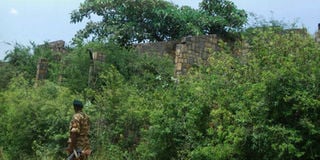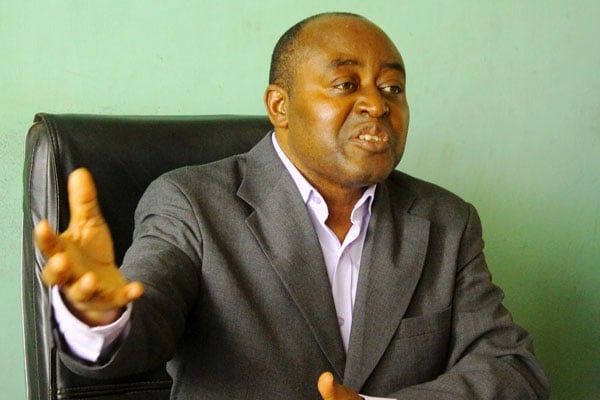Amin’s former state lodge home to leopards

A game ranger stands next to the dilapidated Pakuba State Lodge in the Murchison Falls National Park, Nwoya District recently. PHOTO BY TOBBIAS JOLLY OWINY
Nwoya- Pakuba Safari lodge at Murchison Falls Park, Nwoya District was former President Idd Amin’s favourite state lodge.
The lodge on the hilltop, faces the junction of the two Niles and Lake Albert.
Currently, the once magnificent and most guarded facility, sitting on five acres of land lies in ruins and has become home to deadly wild beasts such as leopards.
For the past 43 years, the government hasn’t had any plans to rejuvenate its beauty apart from some initiatives by private developers.
The eucalyptus canopies, roofing and the shiny stones that once gave the lodge an eye catching appearance have decayed and are no more.
Designed by a Danish architect, Hans Munk Hansen, the construction of the lodge that began in 1970 took four years to be completed.
Mr Pacuto Opiyo, a conservation warden, opens the safes of his rifle as we slowly tiptoe towards the former main entrance of the ruined facility.
He wades carefully while keeping his eyes in all directions as he approaches the dilapidated swimming pool behind the block from the southern side.
To Mr Opiyo, accessing the ruins has been out of bounds to visitors, except when with heavy security since the state lodge has been taken up by leopards and buffaloes that now use it as a home.
“Sometimes you can hear these big cats roaring from as far as 200m away. This usually happens when they are hungry, playing, fighting or inviting others for a feast after a good kill,” Mr Opiyo says in a low fading voice as he passes through an entrance to the pool side.
Haven for wild animals
The pool section, covered in thick thorns and tall bushes, lies on 90 square metres of stone flooring.
After checking the pool side and ensuring that it is safe, Mr Opiyo finally invites the rest of us through.
From the east corner of the pool lies remains of freshly eaten impala.
He warns us not to move an inch to the leopards prey.
“The leopards could probably be prowling nearby since they sensed us. We have to leave now,” he says.
The swimming pool is dilapidated, and around it are both small and big piles of fresh dung that the warden identifies to be of buffaloes and elephants.
The leopards inside the structure start to roar again and we exit the pool side.
According to the warden, the beasts now man the swimming pool. It is their resting place and hide away from the scorching sun.
He says the leopards have also taken over the bedrooms, the former restaurant and the lounge.
Mr Tom Obong Okello, the Murchison Falls National Park conservation manager, told Daily Monitor in an interview recently that there had been plans by Pakuba Safaris management to refurbish the facility but it has taken forever. “It is true there has been that plan to renovate it because the wreckage that remains is still strong enough to be developed but that is under Pakuba Safaris not UWA. However, I can’t tell when that will be,” Mr Okello said.
He said the war in northern Uganda led to the destruction of Pakuba Safari Lodge.
It’s fairly easy to imagine the former safari lodge in its heydays stood tall and attractive since a wrecked skeleton of the complex rises from the high grass.
The two-storeyed building accommodated 160 people and employed more than 120 while each room had a balcony overlooking the Nile junction.
Uganda Wildlife Authority prohibits any access to the interior of the ruins by tourists because of the practical danger that waits inside.
Only a single tract runs from the northern side of the ruins and any visitor interested in seeing the leopards is only limited to see them from their windows.
“No one is allowed inside the ruins, we have very dangerous animals living and breeding inside. We don’t want to risk the lives of visitors,” Mr Opiyo said.
Mr Opiyo alleges that the lodge which is strategically located in the Park was used to aid Amin’s right hand men who smuggled ivory to other countries in exchange of fire arms, especially through the neighboring Democratic Republic of Congo.
Mr Emmanuel Mujuni, the Pakuba Safaris hotel general manager, said they are trying to put back the luxurious wings and apartments to upgrade the facility to an international level. “We are trying to improve and expand this environment day by day. We have put up a swimming pool overlooking River Nile,” Mr Mujuni said.
According to the state minister for Tourism, Mr Godfrey Kiwanda, a private developer to whom the contract to renovate Pakuba was given, has failed to deliver.
“It was given to a one, Mr Tumusime and it has gone past the agreed three years. He instead decided to develop the formerly staff quarters into the new lodge contrary to what we agreed with him,” Mr Kiwanda told Daily Monitor on Tuesday.
The minister said they will visit the site soon for an assessment while they seek other options.
In the agreement, the minister said the developer needed to restore the ruins, the dilapidated swimming pool and the airstrip
Murchison Falls National Park, the biggest national park in Uganda, in the early 1970’s was known to be home to Africa’s biggest population of elephants, lions, giraffes and Nile crocodiles; one of the predators that Idi Amin loved to hunt for sport.
However, by the end of his eight-year dictatorial rule, the elephant population of Murchison Falls National Park had fallen from an astonishing 12,000 to less than 200 elephants according to records availed by the authorities of Murchison National park.
Besides Pakuba Safari lodge, Amin’s former state lodge built 1975 in Lututuru hill, in Agoro Sub-county, 35km away from Lamwo Town council, is also dilapidated.



